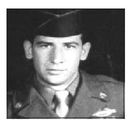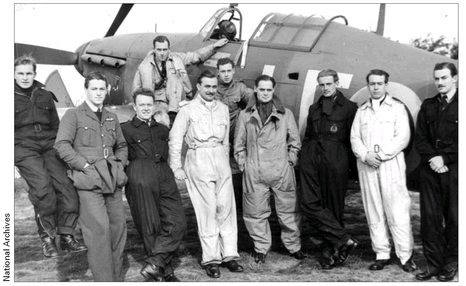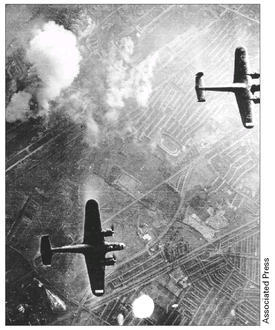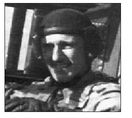War Stories III (4 page)
Authors: Oliver L. North

ANGELO MONTEMARO
Brooklyn, New York
2 July 1940
2 July 1940

I was working then at the Hotel Commodore as a bellhop. I had been doing that for three years. The Depression was terribleâthat's when Franklin Delano Roosevelt started the WPA. I had three brothers on the WPA. When Hitler went into Poland, the U.S. started mandatory conscription, and you had to go into the service. That's why my brother Joe was in the service already.
I graduated high school in 1937. I wanted to go to college but I couldn't go because my family was pretty poor. So I got my higher education at the Hotel Commodore. When the war finally started, I got my draft notice about six months later. Now we were five brothers in the service, and our folks were pretty proud. My brother Mike was in the Marine Corps. He went to Iwo Jima. My brother Vincent was a doctor, and a colonel in the Army Medical Corps. My brother Joe was with an artillery
unit and my youngest brother, Peter, was in the Army Air Force. I was in the infantry.
unit and my youngest brother, Peter, was in the Army Air Force. I was in the infantry.
I had ninety days in Camp Cross. Then they took us to Fort Mead, Maryland. From there we went to Fort Kilmer, and then to Camp Miles Standish in Boston. From there we went across the North Atlantic in a convoy that took us twenty-three days to get to Plymouth, England. They were really happy to see us.

Following his 1940 reelection, President Roosevelt declared that the United States should become “the great arsenal of democracy.” In August 1941 FDR and British prime minister Winston Churchill announced new Allied goals for dealing with Hitler's aggression, presented in what they called the Atlantic Charter. Britain and America each pledged to respect “the right of all peoples to choose the form of government under which they will live.” Both also promised a free world without war “after the final destruction of Nazi tyranny.”
By then, the Royal Air Force had all but won perhaps one of the most lopsided and revolutionary series of engagements in the history of warfareâthe “Battle of Britain.” As America slowly mobilized to confront the great peril of Hitler's aggression, the Royal Air Force and the German Luftwaffe were dueling in the skies over the British Isles. The 10 Julyâ30 October 1940 aerial battle made it possible for Britain to survive. Winston Churchill characterized it as “their finest hour.”
CHAPTER 2
THE BATTLE OF BRITAIN AND THE LONDON BLITZ JULYâOCTOBER 1940
T
he fall of France on 22 June 1940 presented Hitler with a new strategic dilemma: what to do about the British Isles. Still hoping that Churchill would come to some kind of accommodation with Germany, the Nazi leader decided to pressure the pesky Brits by ordering highly visible preparations for Operation Sea Lionâthe invasion of England.
he fall of France on 22 June 1940 presented Hitler with a new strategic dilemma: what to do about the British Isles. Still hoping that Churchill would come to some kind of accommodation with Germany, the Nazi leader decided to pressure the pesky Brits by ordering highly visible preparations for Operation Sea Lionâthe invasion of England.
Brushing aside the anxieties of his General Staff, Hitler directed that a fleet of barges, tugs, and landing craft assemble at captured Dutch, Belgian, and French ports. And then, to ratchet up the pressure, on 10 July, he ordered the first significant cross-channel air raids against British shore defenses, merchant ports, and naval installations on the south coast of England.
The Battle of Britain had begun. Its outcome would determine Great Britain's survival as an independent nation.
For six days, groups of twenty to thirty German Dornier 17s, Heinkel 111s, Junkers 87 (Stukas) and Ju-88s, escorted by Messerschmitt 109s and twin-engine Me-110s, flew from hastily repaired French and Belgian airfields. This amazing aircraft armada flew into the teeth of well-prepared British defenses. When these limited attacks produced no softening in
Churchill's resolve, the Reich chancellor issued Führer Directive No. 16, ordering accelerated preparations for Operation Sea Lion. Hitler correctly surmised that without total control of the air over the Channel and the invasion beaches, any attack on England would be doomed to failure.
Churchill's resolve, the Reich chancellor issued Führer Directive No. 16, ordering accelerated preparations for Operation Sea Lion. Hitler correctly surmised that without total control of the air over the Channel and the invasion beaches, any attack on England would be doomed to failure.
Â
“Never in the field of human conflict was so much owed by so many to so few.”

The Luftwaffe was ordered to both prepare the way for Wehrmacht assault forces and “prevent all air attacks” by the Royal Air Force. But now, for the first time since German aggression began in 1938, Hitler learned that just because he ordered something didn't necessarily make it so.
RAF Fighter Command's Supermarine Spitfires and Hawker Hurricanes, vectored by fifty “Chain Home” radar stations, swarmed up to meet the attacking Luftwaffe formations. Hermann Goering, Hitler's air minister, responded by ordering an increase in the number of Me-109 and Me-110 fighter escorts for their bombers.
On 19 July, Hitler summoned the ReichstagâGermany's now impotent legislatureâall of the puppet governors from the conquered territories, the diplomatic corps, and the world press to Berlin's Kroll Opera House for a “victory celebration.” At the conclusion of his lengthy speech, the German dictator made a blatant call for British capitulation: “I feel it is my duty,
before my own conscience to appeal once more to reason and common sense in Great Britain and elsewhere. I consider myself in a position to make this appeal since I am not the vanquished begging for favors, but the victor speaking in the name of reason. I see no reason why this war must go on.”
before my own conscience to appeal once more to reason and common sense in Great Britain and elsewhere. I consider myself in a position to make this appeal since I am not the vanquished begging for favors, but the victor speaking in the name of reason. I see no reason why this war must go on.”
While waiting for Churchill to accept the futility of further resistance, the Luftwaffe continued its daily raidsâwith inevitable dogfights over the Channel and the fields of southern England. By the end of the month the Luftwaffe had lost more than 100 bombers and eighty fighters while the RAF had lost just seventy Spitfires and Hurricanes. While almost half the British pilots had parachuted to safety over friendly territory, nearly all the downed German airmen were killed or captured.
On 30 July Hitler summoned his commanders to Berghof, his Bavarian retreat. There he reiterated his decision to double the number of Panzer divisions from ten to twenty and increase the Wehrmacht from 120 to 180 divisions. Two days later he issued Führer Directive No. 17, launching Operation Eagle and ordering the Luftwaffe to “overpower the English air force.”
Goering commanded his pilots to effectively double the number of strikes against British “flying units,” bases, aircraft plants, and anti-aircraft installations and predicted that his pilots would “crush Britain.” Fortunately for the British, the Luftwaffe never developed a coherent plan for doing soânor did Goering, a World War I ace, ever seem to grasp the importance that radar played in defeating the German air offensive.
Â
German Dornier planes over Britain.

For another two weeks Luftwaffe bombers pounded RAF fighter bases and bomber fields, the piers at Portsmouth, munitions plants, and shipping along the Thames and in the English Channel. Only once were any of the radar stations hitâand none of the German raids succeeded in disrupting the carefully integrated RAF early warning and control centers.
When he met with his senior military commanders at the Reich Chancellery on 14 August, Hitler once again expressed his hopes that the air campaign would bring the stubborn British to some accommodation, to protect their “Asian colonies and trade from Japanese aggression.” But the next day, losses of Stukas and pilots were so high that Kesselring and Sperrle, commanders of the Luftwaffe 2nd and 3rd Air Fleets, stopped sending the dive-bombers across the channel.
For the German Me-109 pilots escorting the bombers, each trip over England became increasingly dangerous as the RAF fighter pilots gained proficiency and experience. Gunther Raal, a young pilot from Stuttgart, Germany, saw this transition firsthand from the cockpit of his Me-109.
GUNTHER RAAL, LUFTWAFFE PILOT
Qoquel Airfield, Near Calais, France
15 August 1940
15 August 1940

I joined the army as a cadet at the age of eighteen. Then I changed to become an officer to the air force when I was twenty years old because I wanted to fly. I was not politically orientatedâand besides, active duty officers weren't allowed to join political parties. I just wanted to serve my country.
I went to a famous fighter pilot school northeast of Berlin. Just when I finished the course, the war started. In those days we didn't count flying hours, not even takeoffs or sorties. Once you got your wings you decided whether to go into bombers or fighters. My temperament is for a fighter pilot. I wanted to sit alone in my airplane and fight, not as part of a crew in a plane. That's not my temperament.
I was just twenty-two years old when I saw combat for the first time. When the war started, my squadron of Messerschmitt Me-109 fighters was on the frontier with France and there was hesitation on both sides about flying across the border. The French flew down the Rhine on the western side, and we on the eastern side. Then in May '40, the Wehrmacht moved into France and we had our first air-to-air contact. Mine was against a Curtis P-36 and it was my first victory.
After the French surrendered, we were told to prepare for the invasion of England. I was a lieutenant in one of the fighter units with the mission of escorting the bombers to their targets in England. At first our assignment was to escort Stuka Ju-87 dive-bombers. These were very slow flying airplanes, and our fighter escorts had to stay close by. We would meet them at a rendezvous point over France and then lead them over to England. Our Messerschmidt 109sâthe escortsâwere good aircraft, but as we approached the coast, the British Spitfires would be waiting for us upstairs. And we lost a lot of pilots.
At first they just had us go after military targetsânot the cities. But even after we switched to using just the Dornier and Heinkel bombersâthey were faster than the Stukasâbut the Luftwaffe wasn't a strategic air force. Precision bombing was not that far developed, and our fighters didn't have the range to escort the bombers all the way to targets on the west side of the island. The whole concept was wrong. The weather was terribleâand just got worse as the summer wore on.
The British pilots had the advantage of defending their own territoryâand many of them were very good. As we lost pilots and planes, the British just kept getting more of both. Their Spitfires and Hurricanes were no better than our Me-109sâbut they could stay up longer because they were fighting right over their own airfields. We could only engage for a few minutes before we had to turn and go back across the channel before we ran out of fuel.
I was credited with shooting down 275 planes because I flew fighters in combat for five and a half years, except when I was in hospital. The best pilots are those who fly many missions. The best British pilots were the
ones who flew hundreds of missionsâthat's what makes a good pilot. All of us had the greatest respect for the Royal Air Force. Their tactics and skills were excellent.
ones who flew hundreds of missionsâthat's what makes a good pilot. All of us had the greatest respect for the Royal Air Force. Their tactics and skills were excellent.
Other books
Lady Vixen by Shirlee Busbee
Noon by Aatish Taseer
Rebellion Project by Sara Schoen
Royally Seduced by Marie Donovan
The Wings of Dragons: Book One of the Dragoon Saga by Josh VanBrakle
Ransom of Love by Al Lacy
A Santini's Heart (The Santinis Book 10) by Melissa Schroeder
Fit2Fat2Fit by Drew Manning
The Billionaire's Baby by Dahlia Rose
Passion's Price by Gwynne Forster
